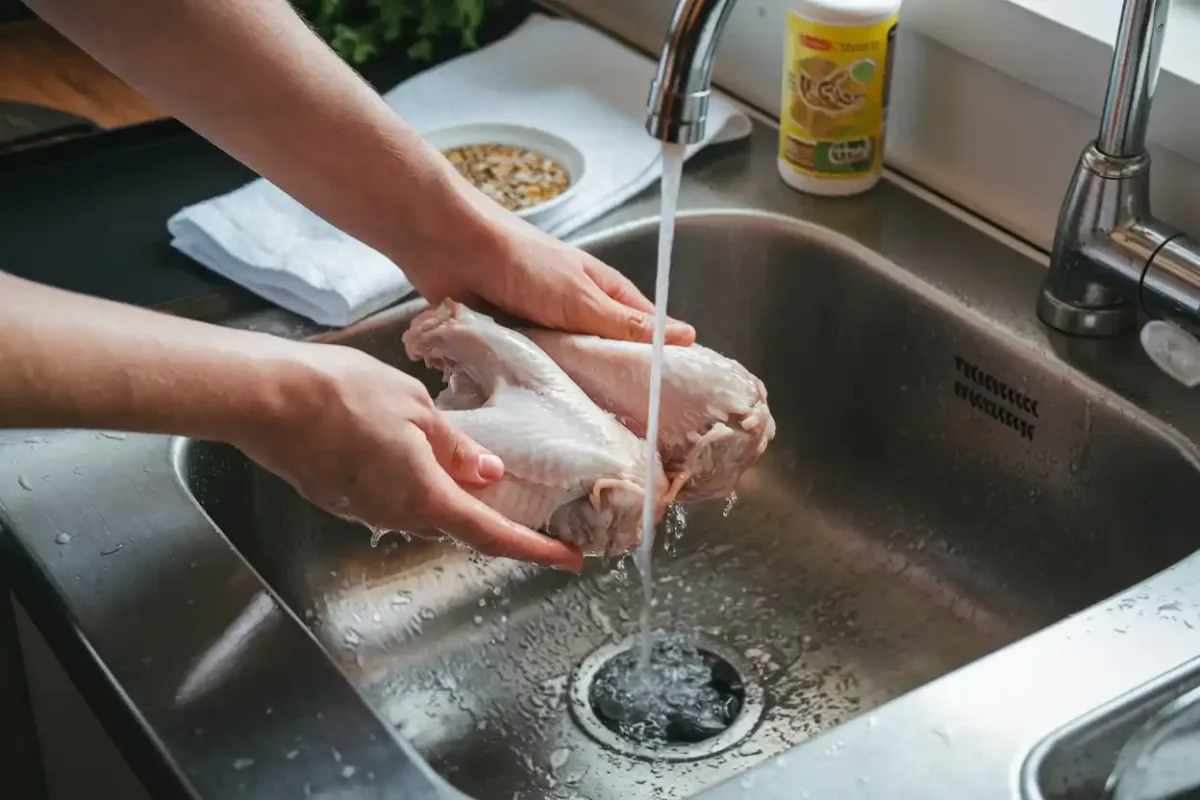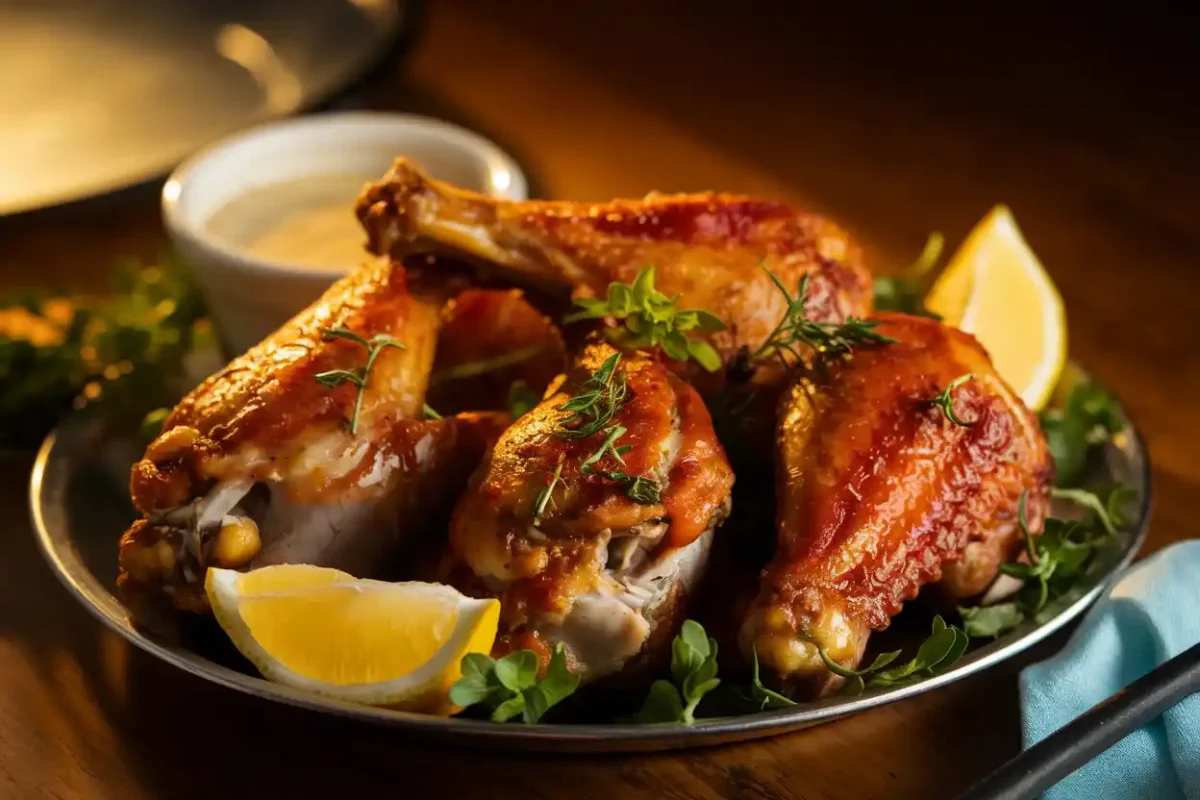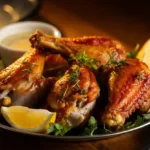Soaking Turkey Wings in Vinegar
If you’ve ever heard someone mention soaking turkey wings in vinegar, you might have wondered—why do people do it? Is it just a tradition, or does it actually improve the taste and texture of the meat? The truth is, soaking turkey wings in vinegar serves several purposes, from cleaning the meat to enhancing its flavor.
In many households, especially in Southern and Caribbean cooking, using vinegar in meat preparation is a common practice. Some believe it helps remove bacteria, while others say it makes the meat more tender. But does vinegar really work, or is it just an old wives’ tale? In this article, we’ll dive deep into the reasons behind soaking turkey wings in vinegar, the benefits, and the right way to do it.
“Soaking turkey wings in vinegar is more than just a kitchen trick—it’s a science-backed method for cleaner, more flavorful poultry.”
What Does Soaking in Vinegar Mean?
Soaking meat in vinegar simply means submerging it in a mixture of vinegar and water for a certain period of time before cooking. This is usually done to clean the meat, reduce any strong or gamey odors, and even tenderize it.
While vinegar soaking is common for turkey wings, it’s also used for other meats like chicken, pork, and even fish. But why vinegar? Vinegar is an acidic liquid that has been used in cooking and preservation for centuries. It helps break down tough proteins, making meat easier to chew and digest.
The Science Behind Using Vinegar in Cooking
Vinegar is acidic, with a pH level between 2 and 3, depending on the type. This acidity helps in a few key ways:
- Breaking Down Tough Fibers: Vinegar helps tenderize meat by breaking down proteins, making turkey wings softer and juicier.
- Killing Bacteria: Vinegar has natural antibacterial properties, which help reduce the risk of contamination.
- Enhancing Flavor Absorption: The acidity of vinegar opens up the meat fibers, allowing marinades and seasonings to penetrate deeper.
- Neutralizing Odors: Raw turkey can sometimes have a strong smell, and vinegar helps eliminate unwanted odors.
Common Misconceptions About Vinegar Soaks
There are a lot of myths about soaking turkey wings in vinegar. Some people believe it completely kills all bacteria, while others think it can “cook” the meat like citrus juice does in ceviche. Let’s clear up some common misconceptions:
Does Vinegar Kill All Bacteria?
While vinegar does have antibacterial properties, it’s not a replacement for proper food safety. You still need to cook turkey wings at the correct temperature to fully eliminate harmful bacteria.
Does Vinegar Change the Flavor?
Some people worry that vinegar will make the turkey taste too sour. However, if used correctly, the vinegar rinses off and doesn’t leave a strong taste. Instead, it helps the seasonings stick better, improving the overall flavor.
Will Vinegar Make the Meat Mushy?
If you soak the turkey wings for too long, the acid in the vinegar can start breaking down the proteins too much, making the meat overly soft. The key is knowing how long to soak, which we’ll cover later.
Benefits of Soaking Turkey Wings in Vinegar
Removing Bacteria and Cleaning the Meat
One of the main reasons people use vinegar is for cleaning purposes. Raw poultry can carry bacteria, and many home cooks feel more comfortable rinsing their meat with vinegar before cooking.
Tenderizing Turkey Wings for a Juicier Texture
Nobody likes tough, dry turkey wings. Soaking turkey wings in vinegar helps loosen muscle fibers, making them more tender and easier to chew.
Enhancing Flavor and Reducing Gamey Taste
Turkey, especially dark meat like wings, can have a slightly gamey flavor. Vinegar helps tone down this taste, making the meat more enjoyable.
Neutralizing Odors from Raw Poultry
Ever opened a package of raw turkey and noticed a strong smell? That’s common with poultry, but a quick vinegar soak can help neutralize those odors.
Vinegar Soaking Nutrition Facts
| Nutrient | Effect on Turkey Wings |
|---|---|
| Acidity (pH) | Breaks down proteins, making meat tender |
| Antibacterial Properties | Reduces surface bacteria but does not fully sanitize |
| Flavor Enhancement | Allows seasonings to penetrate deeper into the meat |
| Moisture Retention | Helps prevent dryness in cooked turkey |
Conclusion
Soaking turkey wings in vinegar isn’t just an old kitchen myth—it’s a scientifically backed method for improving poultry. From making the meat cleaner and more tender to enhancing flavor and reducing unwanted odors, vinegar can be a game-changer in your cooking routine.
But how exactly should you soak turkey wings in vinegar? What’s the right ratio, and how long should you let them sit? In Part 2 of this article, we’ll cover the step-by-step guide, different vinegar types, and common mistakes to avoid. Stay tuned!
How to Properly Soak Turkey Wings in Vinegar
Now that you know why soaking turkey wings in vinegar is beneficial, let’s talk about how to do it the right way. The key is using the right type of vinegar, the correct ratio of vinegar to water, and ensuring you don’t over-soak the meat.
Choosing the Right Type of Vinegar
Not all vinegars are created equal. While most people use plain white vinegar, there are several options that can slightly alter the flavor and effectiveness of the soak.
| Type of Vinegar | Benefits |
|---|---|
| White Vinegar | Most common, highly acidic, excellent for cleaning and tenderizing. |
| Apple Cider Vinegar | Milder than white vinegar, adds a slight sweetness to the meat. |
| Rice Vinegar | Less acidic, good for subtle flavor enhancement. |
| Balsamic Vinegar | Too strong for soaking; better for glazes and marinades. |
Step-by-Step Guide to Soaking Turkey Wings

Follow these simple steps to ensure your turkey wings are perfectly cleaned and prepped for cooking.
Step 1: Gather Your Ingredients
- 2 lbs turkey wings
- 1 cup white vinegar (or apple cider vinegar)
- 4 cups cold water
- 1 tablespoon salt (optional)
- 1 large bowl
Step 2: Prepare the Vinegar Solution
In a large bowl, mix the vinegar with water. If desired, add a tablespoon of salt to help further clean the meat.
Step 3: Submerge the Turkey Wings
Place the turkey wings into the vinegar solution, making sure they are fully covered.
Step 4: Soak for the Right Amount of Time
Soaking for the right duration is key. Too little time won’t provide much benefit, while too much time can make the meat overly soft.
| Soaking Time | Effect on Turkey Wings |
|---|---|
| 5-10 minutes | Basic cleaning and odor removal. |
| 15-30 minutes | Better tenderization and flavor absorption. |
| More than 1 hour | Can over-soften meat and alter texture. |
Step 5: Rinse and Pat Dry
After soaking, remove the turkey wings from the vinegar solution and rinse them under cold running water. Pat them dry with paper towels before seasoning or cooking.
What to Do After Soaking – Rinsing & Drying
Once the turkey wings are soaked, it’s important to rinse them thoroughly. Vinegar can leave a residual taste if not rinsed properly. Use cold water and gently rub the meat to remove any excess vinegar.
After rinsing, pat the wings dry using a clean kitchen towel or paper towels. Drying helps the seasoning stick better and ensures a crispier texture when cooking.
Vinegar vs. Other Soaking Methods
Vinegar isn’t the only way to clean and tenderize turkey wings. Let’s compare it to other popular soaking methods.
Vinegar vs. Lemon Juice – Which Is Better?
- Vinegar: More effective at breaking down tough fibers and neutralizing odors.
- Lemon Juice: Provides a citrusy flavor but is less acidic than vinegar.
Winner: Vinegar is better for cleaning and tenderizing, while lemon juice is great for adding fresh flavor.
Saltwater Brining vs. Vinegar Soaking
- Brining: Uses salt to retain moisture but requires longer soaking times.
- Vinegar Soaking: Works faster but doesn’t add moisture like brining.
Winner: If you want juicier wings, go for brining. If you need quick cleaning and tenderizing, use vinegar.
Buttermilk vs. Vinegar – A Southern Tradition
- Buttermilk: Adds richness and slight sweetness, making turkey wings extra tender.
- Vinegar: More for cleaning and odor removal.
Winner: Buttermilk is best for flavor and tenderness, while vinegar is better for cleaning.
Common Mistakes When Soaking Turkey Wings in Vinegar
Even though soaking turkey wings in vinegar is simple, there are a few mistakes to avoid.
Over-Soaking and Its Effects on Texture
Leaving turkey wings in vinegar for too long can break down too much protein, making the meat mushy. Stick to 15-30 minutes for best results.
Using Too Much Vinegar – The Risks
Too much vinegar can overpower the meat’s natural flavor. Always dilute it with water.
Not Rinsing Properly After Soaking
Failing to rinse the turkey wings can leave behind an acidic taste. Always rinse with cold water after soaking.
Expert Tips for the Best Results
The Ideal Vinegar-to-Water Ratio
The perfect ratio is 1 part vinegar to 4 parts water. This keeps the acidity balanced while still being effective.
Combining Vinegar with Herbs and Spices
Adding ingredients like bay leaves, garlic, or black peppercorns to the vinegar soak can enhance the flavor.
Best Cooking Methods After a Vinegar Soak

- Grilling: Gives a smoky, crispy skin.
- Baking: Even cooking with a flavorful crust.
- Frying: Extra crispy texture, especially after a buttermilk dip.
Conclusion
Now that you know exactly how to soak turkey wings in vinegar, you can make sure your poultry is cleaner, more tender, and packed with flavor. Whether you’re using white vinegar for deep cleaning or apple cider vinegar for a mild taste, this technique can take your cooking to the next level.
In Part 3, we’ll answer frequently asked questions about vinegar soaking, discuss if you should always soak poultry, and wrap up with final expert tips!
Frequently Asked Questions About Vinegar Soaking
Now that we’ve covered the science, benefits, and step-by-step process of soaking turkey wings in vinegar, let’s answer some of the most common questions people have about this method.
Can You Use Apple Cider Vinegar Instead of White Vinegar?
Yes! Apple cider vinegar is a great alternative to white vinegar. It has a milder acidity and a slightly sweet, fruity flavor, which some people prefer. While white vinegar is stronger for cleaning, apple cider vinegar still helps tenderize and enhance the taste of turkey wings.
Will Vinegar Affect the Flavor of the Turkey?
Not if used correctly. Many people worry that soaking turkey wings in vinegar will leave a sour taste, but as long as you dilute the vinegar with water and rinse the meat afterward, the taste won’t linger. Instead, vinegar helps the wings absorb seasonings more effectively, making them more flavorful.
Is Vinegar Safe for All Types of Poultry?
Yes, vinegar can be used for chicken, duck, and even game birds like quail. The key is adjusting the soaking time to prevent the meat from becoming too soft. Delicate meats (like chicken breast) should be soaked for shorter periods, while tougher cuts (like turkey wings) can handle a longer soak.
Can You Soak Turkey Wings in Vinegar Overnight?
It’s not recommended. Soaking for too long (especially overnight) can break down the meat’s proteins too much, making it mushy. The best soaking time is between 15 to 30 minutes. If you want to marinate the turkey wings overnight, use a seasoned brine instead.
What If I Don’t Have Vinegar? Are There Alternatives?
If you don’t have vinegar, you can try these substitutes:
- Lemon Juice: Similar acidity to vinegar with a citrusy twist.
- Buttermilk: Works well for tenderizing and adding richness.
- Saltwater Brine: Helps with moisture retention but doesn’t clean as effectively as vinegar.
Each of these alternatives has unique benefits, but if your goal is both cleaning and tenderizing, vinegar is the best option.
Should You Always Soak Turkey Wings in Vinegar?
While soaking turkey wings in vinegar is beneficial, it’s not always necessary. Some chefs skip this step, relying instead on proper cooking temperatures to kill bacteria and seasonings to enhance flavor. So, should you always do it? Let’s break it down.
Reasons to Soak:
- You want extra clean meat: If you’re concerned about bacteria or packaging residue, vinegar soaking is helpful.
- You prefer tender meat: Vinegar helps soften turkey wings, especially if they’re from an older bird.
- You want better flavor absorption: Vinegar opens up meat fibers, allowing marinades to penetrate more deeply.
Reasons to Skip:
- You don’t like the extra step: Rinsing and drying take extra time.
- You’re brining instead: A saltwater brine provides moisture retention without acidity.
- Your turkey wings are already pre-cleaned: If you trust the source of your meat, a vinegar soak may not be necessary.
Final Expert Tips for the Best Results
If you decide to go with soaking turkey wings in vinegar, here are a few expert tips to get the best results:
Use a Balanced Vinegar-to-Water Ratio
A ratio of 1 cup vinegar to 4 cups water is ideal. Too much vinegar can overpower the flavor, while too little won’t be effective.
Don’t Skip the Rinse
After soaking, always rinse turkey wings under cold running water. This prevents any lingering acidic taste and ensures the best flavor.
Dry the Wings Before Cooking
Patting the turkey wings dry before seasoning and cooking is crucial. It helps spices stick better and results in crispier skin when baking or frying.
Combine Vinegar with Seasonings
For even more flavor, add herbs like garlic, bay leaves, black pepper, and thyme to the vinegar soak. This adds depth to the taste while still providing the benefits of vinegar.
Experiment with Different Cooking Methods
Once the turkey wings are soaked, rinsed, and dried, try different cooking techniques:
- Baking: Slow roasting enhances tenderness.
- Grilling: Adds a smoky, charred flavor.
- Frying: Creates crispy, golden-brown skin.
Explore More Delicious Recipes
Final Thoughts on Vinegar Soaking Benefits
Soaking turkey wings in vinegar is an easy and effective way to clean, tenderize, and enhance the flavor of your poultry. Whether you’re preparing turkey wings for a backyard BBQ, a holiday feast, or a weeknight dinner, this method ensures they turn out juicy, flavorful, and perfectly cooked.
“A little vinegar goes a long way! With the right soak time and technique, turkey wings can be cleaner, tastier, and more tender than ever.”
So, will you try soaking turkey wings in vinegar the next time you cook? Whether you’re a seasoned chef or a home cook experimenting in the kitchen, this simple technique can elevate your dishes to the next level.
Happy cooking with Rita chef ❤️!
Print
Why Do You Soak Turkey Wings in Vinegar?
- Total Time: 20 to 35 minutes
- Yield: 4 servings 1x
Description
Soaking turkey wings in vinegar is a common practice in Southern and Caribbean cooking It helps clean the meat reduce strong odors tenderize the meat and enhance flavor Vinegar has natural antibacterial properties and its acidity helps break down tough proteins making turkey wings softer and juicier This guide will explain the benefits of soaking turkey wings in vinegar how to do it properly and how to avoid common mistakes
Ingredients
For the Vinegar Soak
2 lbs turkey wings
1 cup white vinegar or apple cider vinegar
4 cups cold water
1 tablespoon salt optional
Instructions
In a large bowl mix vinegar with water If desired add salt to help further clean the meat
Place the turkey wings into the vinegar solution making sure they are fully covered
Soak for 15 to 30 minutes for optimal results Soaking for less than 10 minutes provides basic cleaning while soaking for more than an hour can make the meat too soft
After soaking remove the turkey wings from the vinegar solution and rinse them under cold running water Pat them dry with paper towels before seasoning or cooking
Notes
Use white vinegar for stronger cleaning power or apple cider vinegar for a milder taste
Do not soak for too long as vinegar can break down the meat too much making it mushy
Always rinse the turkey wings after soaking to remove excess acidity
If using lemon juice as an alternative soak for a shorter time since it is less acidic than vinegar
- Prep Time: 5 minutes
- Cook Time: 15 to 30 minutes
- Category: Preparation Technique
- Method: Soaking and Rinsing
- Cuisine: Southern Caribbean American
Nutrition
- Serving Size: 1 serving
- Calories: N/A does not significantly affect calorie content
- Sugar: 0 g
- Sodium: 500 mg if salt is added
- Fat: N/A does not affect fat content
- Saturated Fat: N/A
- Unsaturated Fat: N/A
- Trans Fat: N/A
- Carbohydrates: 0 g
- Fiber: 0 g
- Protein: N/A does not affect protein content
- Cholesterol: N/A

